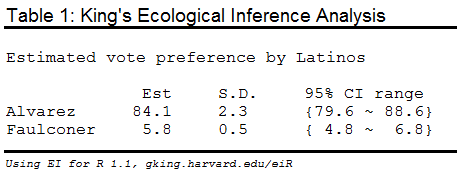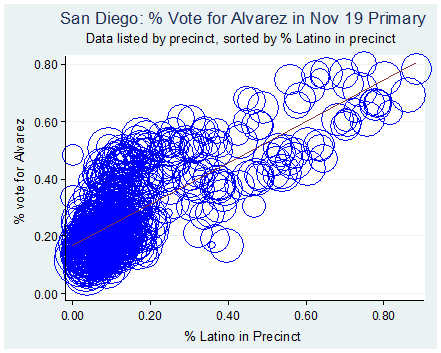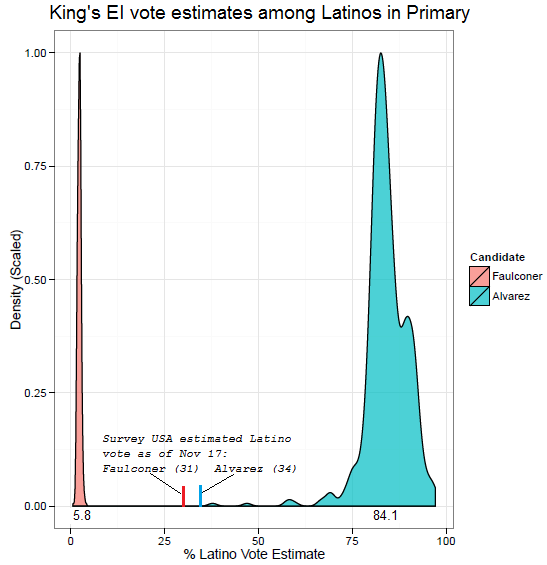The best way to assess how accurate current polls in the San Diego mayoral race are is to look at their past performance and compare to actual election outcomes. This is the same technique that 538 polling guru Nate Silver uses to assigns accuracy weights to different polling companies. New data analysis of the November 19, 2013 mayoral primary results provides hard evidence that existing polling by the San Diego Union Tribune/Survey USA dramatically under-count Latino votes, and thereby underestimate the citywide vote share for Latino-preferred candidate David Alvarez.
In their final poll before the November 19 primary the San Diego UT/Survey USA poll estimated Alvarez citywide at 22% support and garnering 34% support from Latinos, while 66% of Latinos favored other candidates according to their English-only robo polling. Today, we look back at the official precinct-by-precinct election results posted online here by San Diego County Registrar of Voters. The official statement of votes cast detail how all 581 precincts in the city of San Diego voted, and what percent Alvarez, Fletcher, Faulconer and other candidates received in each precinct. We can then add demographic data on what percent of the voters in each precinct are Hispanic or Latino from the UC Berkeley Statewide Database (San Diego County data posted here). Finally, we use a statistical analysis developed by Harvard Political Science Professor Gary King called ecological inference to tell us exactly how Latinos voted for mayor in the November 19 primary. Professor King’s method is a highly reliable statistical technique that has been cited by Federal Courts as the most appropriate way to estimate voting rates by different racial or ethnic groups when using precinct data.
So what do the official data show? According to an ecological analysis, the Latino vote went 84.1% for Alvarez in the primary and 5.8% for Faulconer (with 7.3% for Fletcher and 2.8% for all other candidates).

For those skeptical of the statistical analysis, even eye-balling a scatterplot of the data shows quite clearly that the most heavily Latino precincts in San Diego were voting for Alvarez in the 80% range during the primary. The ecological inference analysis takes all the precinct data from the scatterplot and fits a pattern to tell us what the vote for Alvarez would look like in a precinct that was 100% Latino, versus one that was 0% Latino.

Even when accounting for the possible range, Professor King’s analysis confirms with certainty that the Latino vote for Alvarez was between 79.6% and 88.6% while the range for Faulconer was between 4.8% and 6.8%. Thus, there is zero statistical probability that the Union Tribune/Survey USA poll two days before the November 19 primary was correct. Recall the UT/SUSA poll estimated the Latino vote at just 34% for Alvarez and 31% for Faulconer when the official vote returns suggest it was 84.1% for Alvarez to 5.8% for Faulconer. This considerable error in their polling also helps explain why they underestimated Alvarez citywide support at only 22% going into the November 19 primary when in fact he won 27% of the vote on election day.

In contrast to the Union Tribune/Survey USA poll a Latino Victory Project poll conducted by Latino Decisions has reported the Latino electorate favors Alvarez in the February 11 runoff by a 75% to 10% margin (with 15% undecided). As pollsters continue to use incorrect methodology in surveying Latinos, their overall results will be wrong because the Latino sample comprises a critical share of all voters. In Nevada in 2010 the Las Vegas Review Journal dumped their pollster after their polls all showed Harry Reid would lose the election, specifically noting their bad track record at polling Latino voters. In 2012 it was the same polling outfit, Mason Dixon, this time giving Romney a 7-point lead in Florida in a poll for the Tampa Bay Times. Just like in Nevada, their Latino sample was small, English-only, and not representative. Regardless of which candidate wins the San Diego mayoral election, pollsters and the media who report them need to take note of the growing Latino population in their jurisdictions and collect accurate, representative samples of Latino voters, or their overall poll results will continue to be wrong.

